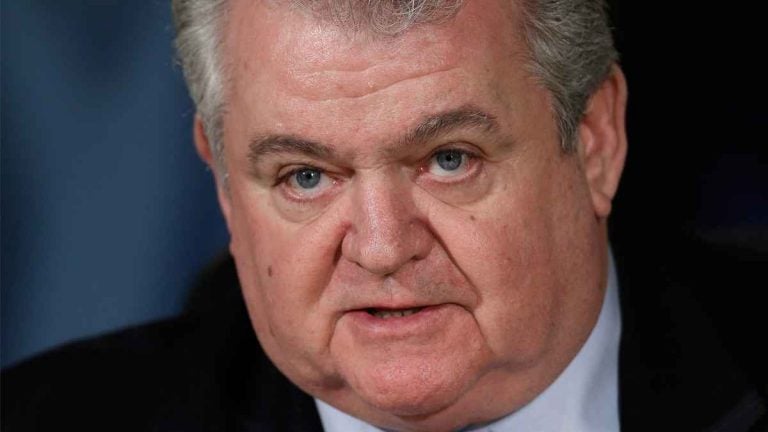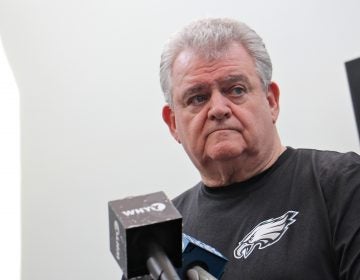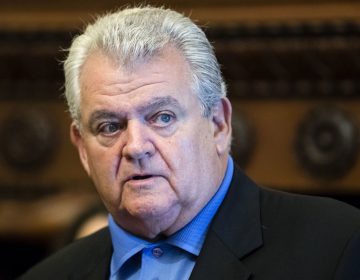Charges now unlikely for Brady in probe of $90,000 transfer to political rival
It appears U.S. Rep. Bob Brady of Philadelphia may skate on the investigation into his 2012 primary opponent's withdrawal from the campaign.
Listen 4:40
Congressman Bob Brady, D-Philadelphia. (Matt Rourke/AP Photo, file)
After spending months under the cloud of a grand jury investigation, it appears Philadelphia U.S. Rep. Bob Brady is unlikely to be charged with crimes associated with an alleged deal to get an opponent out of the 2012 Democratic primary election for his seat.
In a number of court filings, federal prosecutors say Brady pledged $90,000 from his campaign fund to retire the debt of Jimmie Moore in return for Moore’s withdrawal from the race. They also claim Brady and two associates disguised the payment with sham transactions to avoid violating campaign finance laws.
The 5-year statute of limitations on the specific acts Brady could be charged with expired at various dates this year, but Brady had entered into several agreements with prosecutors to extend the deadline to give them more time to consider the facts and the law.
Brady’s attorney, James Eisenhower, confirmed that the extensions of the statute of limitations have expired on the key transactions involved in the alleged deal.
“We did give the government extra time to consider the arguments and the law,” Eisenhower said in a phone interview. “As I said all along, the congressman has done nothing wrong.”
Eisenhower declined to draw any conclusions about prosecutors’ intentions from the fact that the government did not seek further extensions of the statute limitations.
Defense attorneys sometimes enter into such arrangements, calling “tolling agreements,” to maintain good relations with prosecutors and convince them their clients have nothing to hide.
“The congressman has been completely cooperative with the Justice department in supplying anything they ask for and answering all their questions for many months,” Eisenhower said.
Other charges
Moore and his former campaign manager, Carolyn Caveness, have pleaded guilty to campaign finance violations in the case and are cooperating with prosecutors.
In addition, two political consultants close to Brady — Ken Smukler and Donald “D.A.” Jones — are accused of funneling payments from Brady’s campaign to Moore and Caveness. Prosecutors say they were phony transactions designed to disguise the political payoff to get Moore out of the race.
The charges were filed against Smukler and Jones before their statutes of limitations expired, so they’re now awaiting trial.
It’s not clear what role Brady played in the financial transactions, but even if Smukler and Jones were to testify that Brady was intimately involved, the expiration of the statute of limitations appears to ensure he can’t be charged.
A cover-up?
Even if Brady can’t be charged in connection with the payments involved with the deal, a government filing unsealed recently suggests he could be charged with lying to the FBI earlier this year.
Eisenhower has said that the $90,000 in payments Brady’s campaign made were for the legitimate purchases of campaign services and materials, including an extensive poll Moore commissioned that could have been of value to Brady.
Prosecutors say the reported purchase of the poll in the summer of 2012 was a sham transaction because Brady had already acquired a copy of the poll from a political operative months before, in December, 2011.
Brady’s camp contends it was paying Moore not for a copy of the poll, but for exclusive ownership of it, which would permit its use in other ways, such as quoting it in memos and fundraising appeals.
Prosecutors said in a recent court filing that they have an email proving Brady got the poll in late 2011. But Brady told FBI agents in an April interview that he didn’t have the poll until his campaign purchased it after Moore’s withdrawal.
While the filings suggest Brady misstated facts in the April FBI interview, prosecutors would have to prove he intended to deceive investigators. Brady could argue that his memory was faulty about events which occurred five years earlier.
Federal prosecutors typically don’t comment on investigations — so probes that don’t yield charges against a potential subject may never have a definitive ending.
True to form, a spokeswoman for the U.S. attorney’s office declined to comment on the Brady matter.
WHYY is your source for fact-based, in-depth journalism and information. As a nonprofit organization, we rely on financial support from readers like you. Please give today.




